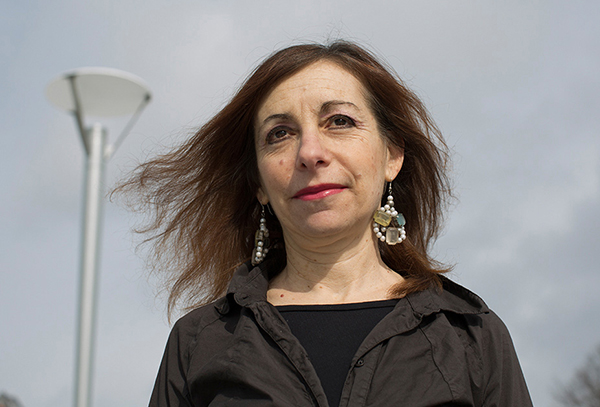Renewable fuels alone can't stop climate change
By Linda B. Glaser

In discussions about climate change, many people seem to think the only real problem is replacing fossil fuels, and once that’s done nothing much really needs to change. “That’s not only false, it’s a really dangerous way of thinking,” said Karen Pinkus, professor of Romance studies and comparative literature in the College of Arts and Sciences.
Her new book, “Fuel: A Speculative Dictionary,” works to undo the assumption that all we have to do is scale up renewable fuels on the free market “and then everything will be rainbows and unicorns,” she said. “Climate change is terrifyingly heterogeneous and complex, from the long timescales of greenhouse gases in the atmosphere to the knots binding capitalism and fossil fuels; from inequality to massive global disruption. Now more than ever, the idea that conservation or virtuous consumerism of ‘good fuels’ can make a difference is simply delusional.”
Pinkus chose a dictionary format for her book as a way of undercutting the certainty people feel after reading traditional narratives of hope or despair. Her goal is to scramble our thinking about fuel – “not in order to demonize energy and not in order to create a new hierarchy in which certain renewables take over from fossil fuels,” she said, “but instead to open up potential ways of interacting with real and imaginary substances, by wrenching them out of narrative and placing them into an idiosyncratic dictionary to be applied by readers into new narratives.”
Entries in the book range from “air” to “Zyklon D,” from the “dilithium crystals” of “Star Trek” to “whale oil.” Pinkus draws from an eclectic range of sources for her explanations of the terms, from historical anecdotes like the Ford Fiesta “boozemobile,” literature like the “Odyssey” and films like “Oblivion.”
Although most people tend to confuse and conflate “fuel” and “energy” in their speech, for Pinkus the difference is crucial: Fuel is a substance, and energy is a system; the substance is inserted into the system. For example, gasoline is a fuel that is extracted from the ground and put into our cars and boilers, whereas nuclear energy is a system that is fueled by uranium.
Pinkus became fascinated with the idea that if we made this distinction – thought about fuels as something separate – that it would bring us to a different way of confronting climate change. The result, she says, was “Fuel.”
Rather than espousing one fuel as being the “next big thing,” the encyclopedic sweep of “Fuel” encourages readers to think expansively about what fuel can be. Pinkus even references a 16th-century Renaissance treatise that recommended running goats on wheels to create power for a mining operation.
Research for the book took Pinkus to many locations, including the Ford Motor Co. archive in Dearborn, Michigan, where she found letters from inventors written to Henry Ford that outlined alternatives to gasoline. “Some of the ideas were ridiculous fake inventions, but some were interesting, like bananas for biomass, and I realized that the idea of alternative fuels wasn’t just tied to climate change but was widespread and had a long history,” said Pinkus.
In a collaboration with artist and landscape architect Hans Baumann, Pinkus is now working on an art exhibit inspired by “Fuel,” in which artists contribute works that engage with fuel as a substance.
In addition to ongoing research on labor, cinema and machines in 1960s Italy, Pinkus’ next book project grew out of “Fuel” and examines the subsurface, from which fossil fuels are extracted and into which waste is deposited, in philosophical and narrative terms; it is tentatively titled “Down There: The Subsurface in the Time of Climate Change.” As part of her research, she hopes to do field work with the Cornell Earth Source Heat.
Linda B. Glaser is a staff writer for the College of Arts and Sciences.
Media Contact
Get Cornell news delivered right to your inbox.
Subscribe